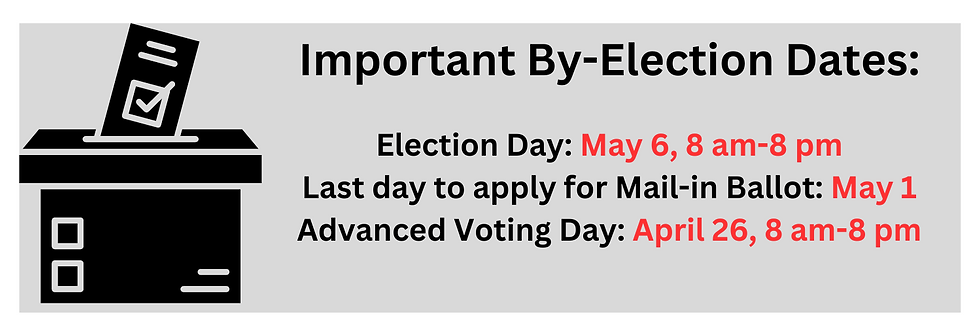Candidate Jaime Cunliffe Meet & Greet
- kc dyer

- Apr 26, 2023
- 5 min read
Updated: Jun 17
Experience Seen as a Key Asset
For a sodden Sunday night, turnout was excellent for Jaime Cunliffe's meet and greet at Broughton Hall on April 23. The seats filled up early, and once all the latecomers made their way in from the rain, more than 100 people filled the seats.
Council members past and present joined the throng, with current Mayor Ken Berry and Councillors Marcus Reuter, Neville Abbott and Michael Broughton among the attendees. Former mayors Ron McLaughlin, Brenda Broughton, and Karl Buhr (now the new Acting Public Works Manager) and former councillor Fred Bain were also present, as was former Building Official Dave Butler.
"Our goal for the evening is to provide our residents with the opportunity to listen and understand, and to demonstrate the depth of Jaime's knowledge of municipal politics and procedures," said campaign supporter Leslie Nolin. "Having already spent four years on Council, she understands the needs of Lions Bay, and is committed to investing her time, experience and energy in our village."
The evening opened as Ute Phillips welcomed residents and thanked them for coming. "This is a very important by-election," she said in her opening remarks. "And making an informed decision is the responsibility of every voter."
Jonathan Wreglesworth stepped forward to introduce the candidate. He spoke of Cunliffe warmly as a long-time friend, noting that when they discovered long after they'd met that both had been neighbours in Gastown, it was a great example of how good paths lead to Lions Bay. "A vote for Jaime is a vote for an independent, non-partisan critical thinker," he said, adding that after four years experience as a councillor, "she has a deep and clear understanding of municipal processes, regulations and finances."
Cunliffe opened with her story of moving to the village in 2011, noting that the youngest of her four children was born here. She talked about her work in the end-of-life sector, and how that career has prepared her to listen without judgement. With her previous experience on council, she said she looks forward to helping the current council get back on track. "I think it's important we focus on the infrastructure plans that have been put aside – the Infrastructure Master Plan details projects that need to be addressed. I'd also like to see protection of our natural assets." Noting how Covid has derailed so many community objectives, she said she is anxious to get started and learn residents' main priorities.
In the Q&A portion of the evening, Cunliffe fielded questions on topics including climate action, parking woes, the polarization of the village and censorship.
Greg Weary, a member of the Climate Action Committee, opened the questioning by asking about Cunliffe's interest in supporting volunteer efforts to protect the watershed. She said she strongly supports of watershed protection, but her past efforts have shown that the Province is not interested in closing off trails to protect village water quality, so volunteers are needed to help educate the public.
Resident Liz Bell, noting that she has lived in the village 40 years, asked Cunliffe to address the balance between maintaining infrastructure and retaining the natural environment that brought most residents to the village. Cunliffe replied that while infrastructure is "not a sexy issue," it is essentially about maintenance. She called for education and community engagement, to help people understand how the village can find the best balance. Later in the evening, resident Jerry Blackwell asked Cunliffe to identify her priority in the long list of outstanding infrastructure projects. She said she'd like to see the Bayview Drinking Water Improvement Plan (DWIP) underway, considering it the most important and 'shovel ready' of the outstanding projects. "It affects the water flow to the school. Right now if there actually was a fire, there's not adequate water flow to provide the pressure that the firemen need to put out the fire."
Several residents including John Coville, Jeffrey Sperling, Ehsan Monfared and Gail Craig asked the candidate about her plans for addressing the polarization of the council, adherance to council procedures, and the current divisions within the village.
In each case, Cunliffe said that if elected, she plans to lead by example, re-establishing trust and decorum at the council table and working toward common ground. "What's happening in Council right now is unbecoming, and it's not who we are."
She also stated her appreciation for the presence and support of Ministry of Municipal Affairs appointee Randy Diehl, noting that his presence is already making a difference. Regarding what resident Kirsty Pappas called a "mass exodus of staff," Cunliffe discussed how the last council had hoped to put a performance review system in place for the CAO, who would then be responsible for reviewing staff, and she is hoping the current council would take this job to completion. "I think it's important to have an appropriate assessment mechanism in place."
Resident Tony Strong stood up to say he strongly objected to the censorship of a resident's letter by Council. Cunliffe agreed, and outlined the process residents can take to have their views heard by Council through letters, asking questions in the public participation element and even making a delegation.
Councillor Michael Broughton noted that Diehl had already commented on the tone of the letters that Council had been receiving, and that it could not be party to the spread of defamation. Later, former mayor Brenda Broughton asked if Cunliffe knew that as an elected official, she was expected to not share opinions about privileged information. Cunliffe replied that she understands the importance of confidentiality, and that councillors take an oath to ensure that information discussed in closed meetings is kept confidential.
Arlene Halstrom spoke to the importance of attending the council meetings in person, and Cunliffe noted the one positive legacy of Covid is the technology that now allows both Councillors and residents to attend meetings online.
Tasha Sparling raised the issues of speeding, highway noise, and lack of enforcement. Cunliffe said that as a Periwinkle Place resident, she does regularly see RCMP enforcement in place, and while noting that any action from higher levels of government takes "an extraordinary amount of time," said she planned to hold the provincial government to their commitment to repave the quiet section of the highway as promised. She also said that she would be open to other methods of speeding enforcement, including a time-over-distance model suggested by former Mayor Buhr.
Housing was also a hot topic. Resident Hugo van Hoogstraten asked what Cunliffe would do to fill the position of Building Inspector, and Cunliffe outlined the process of retaining qualified staff. Alison Dudley inquired about multi-family housing, which Cunliffe noted had been partly addressed before being among the issues derailed by the pandemic. She spoke briefly about the distinction between zoning properties for lane or coach housing and larger developments, which have historically never been approved in the village. Tina and Jan Schneider raised their concerns about sky-rocketing home assessment values, and the possibility that increasing property values might be linked to multiple-dwelling approvals.
After the event, Cunliffe campaign supporter Ute Phillips commented on feedback she'd heard from residents. "Jaime was seen as articulate, well informed, prepared and she spoke with the utmost integrity. This speaks to her years of experience on Council and her commitment to Lions Bay. This was our goal – for residents to experience her as the independent minded, experienced and caring person she is."
"It was so great to see so many villagers actively engaged," said Christine Little, a five year resident. "The turnout was really good, and people were seriously interested in how we can move in a more positive direction."

The Watershed values your opinion. Share your thoughts below, or email us at editor@lionsbaywatershed.ca









Comments